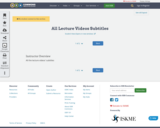
All the lecture videos' subtitles
- Subject:
- Computer Science
- Material Type:
- Lecture Notes
- Author:
- Saeid Samadidana
- Date Added:
- 08/31/2022

All the lecture videos' subtitles
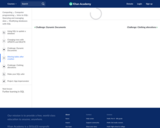
An overview of altering tables after creation
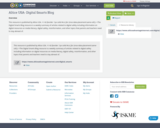
This resource is published by Altice USA. The Digital Smarts Blog resource is a weekly summary of articles related to digital safety including information on digital resources on media literacy, digital safety, misinformation, and other topics that parents and teachers need to stay abreast of.

This course will provide an overview of a new vision for Human-Computer Interaction (HCI) in which people are surrounded by intelligent and intuitive interfaces embedded in the everyday objects around them. It will focus on understanding enabling technologies and studying applications and experiments, and, to a lesser extent, it will address the socio-cultural impact. Students will read and discuss the most relevant articles in related areas: smart environments, smart networked objects, augmented and mixed realities, ubiquitous computing, pervasive computing, tangible computing, intelligent interfaces and wearable computing. Finally, they will be asked to come up with new ideas and start innovative projects in this area.

This course is a comprehensive introduction to control system synthesis in which the digital computer plays a major role, reinforced with hands-on laboratory experience. The course covers elements of real-time computer architecture; input-output interfaces and data converters; analysis and synthesis of sampled-data control systems using classical and modern (state-space) methods; analysis of trade-offs in control algorithms for computation speed and quantization effects. Laboratory projects emphasize practical digital servo interfacing and implementation problems with timing, noise, and nonlinear devices.

6.374 examines the device and circuit level optimization of digital building blocks. Topics covered include: MOS device models including Deep Sub-Micron effects; circuit design styles for logic, arithmetic and sequential blocks; estimation and minimization of energy consumption; interconnect models and parasitics; device sizing and logical effort; timing issues (clock skew and jitter) and active clock distribution techniques; memory architectures, circuits (sense amplifiers) and devices; testing of integrated circuits. The course employs extensive use of circuit layout and SPICE in design projects and software labs.
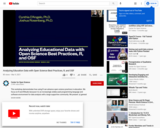
This workshop demonstrates how using R can advance open science practices in education. We focus on R and RStudio because it is an increasingly widely-used programming language and software environment for data analysis with a large supportive community. We present: a) general strategies for using R to analyze educational data and b) accessing and using data on the Open Science Framework (OSF) with R via the osfr package. This session is for those both new to R and those with R experience looking to learn more about strategies and workflows that can help to make it possible to analyze data in a more transparent, reliable, and trustworthy way. Access the workshop slides and supplemental information at https://osf.io/vtcak/.
Resources:
1) Download R: https://www.r-project.org/
2) Download RStudio (a tool that makes R easier to use): https://rstudio.com/products/rstudio/...
3) R for Data Science (a free, digital book about how to do data science with R): https://r4ds.had.co.nz/
4) Tidyverse R packages for data science: https://www.tidyverse.org/
5) RMarkdown from RStudio (including info about R Notebooks): https://rmarkdown.rstudio.com/
6) Data Science in Education Using R: https://datascienceineducation.com/
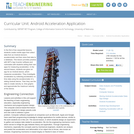
In the first of two sequential lessons, students create mobile apps that collect data from an Android device's accelerometer and then store that data to a database. This lesson provides practice with MIT's App Inventor software and culminates with students writing their own apps for measuring acceleration. In the second lesson, students are given an app for an Android device, which measures acceleration. They investigate acceleration by collecting acceleration vs. time data using the accelerometer of a sliding Android device. Then they use the data to create velocity vs. time graphs and approximate the maximum velocity of the device.
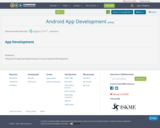
Using the Google developed lessons to learn Android Development.
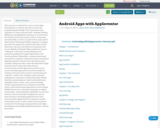
This resource is a Hands-On course to teach Apps Development to students who may not have any programming knowledge. This course has no pre-requisites. It’s time to add the 4th R – Reading, wRiting, aRithmetic and algoRithmic thinking. In a world where the majority of new jobs require science, technology and math skills, it is time our Liberal Arts majors get IT (Information Technology)! While employers recognize and value the importance of liberal education and the liberal arts, they also want liberal arts graduates who are not digitally challenged. Many employers report a “skills gap” as they have trouble finding recent graduates qualified with ample digital skills to fill various positions. Meanwhile, a national educational movement in computer coding instruction is growing at lightning speeds in schools across the US and many consider coding more like a basic life skill (which might someday lead to a great job) rather than an extracurricular activity. App Inventor (AI) serves to narrow this skills gap and increase the versatility of students to become active creators of technology and “digitally” ready for the workplace rather than just being passive consumers of technology. Sales of hand-held devices (smartphones, tablets and phablets) are exploding. These on-line, social, and increasingly mobile computing devices are ubiquitous and offer visual, tactile and personal experiences as never before. Mobile devices in our education landscape are digital and portable - with multimedia capabilities to access the Internet, and are drastically changing the ways we teach and learn. Developing applications for such devices enables digital natives to experience mobile technology as active creators rather than just passive consumers of technology.
Learning Goals
Learn Apps Development
Learn Digital Skills (essential for a Liberal Arts major)
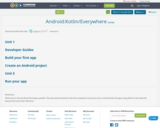
Welcome to the Android developer guides. The documents listed in the left navigation teach you how to build Android apps using APIs in the Android framework and other libraries.
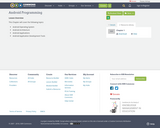
This Chapter will cover the following topics Android Operating System Android Architecture Android Applications Android Application Development Tools
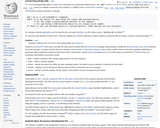
Android software development is the process by which new applications are created for devices running the Android operating system.
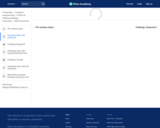
An overview of Animating DOM with setInterval
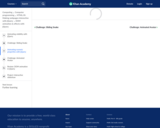
Learn how to use jQuery to animate elements in custom ways, like animating their sizes, borders, and spacing, to whatever values you specify.
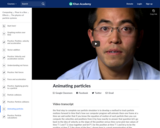
Now we'll pull everything together and explore how we calculate the position of a particle over time (frame by frame).
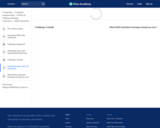
An overview of Animating styles with CSS animations
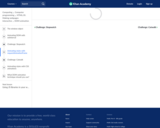
An overview of Animating styles with requestAnimationFrame
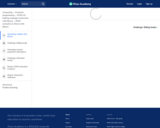
Learn how to use jQuery to show, hide, and toggle elements with animation effects.
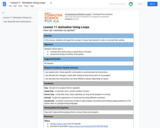
In this lesson, students will apply the concept of loops they learned in order to animate their sprites.